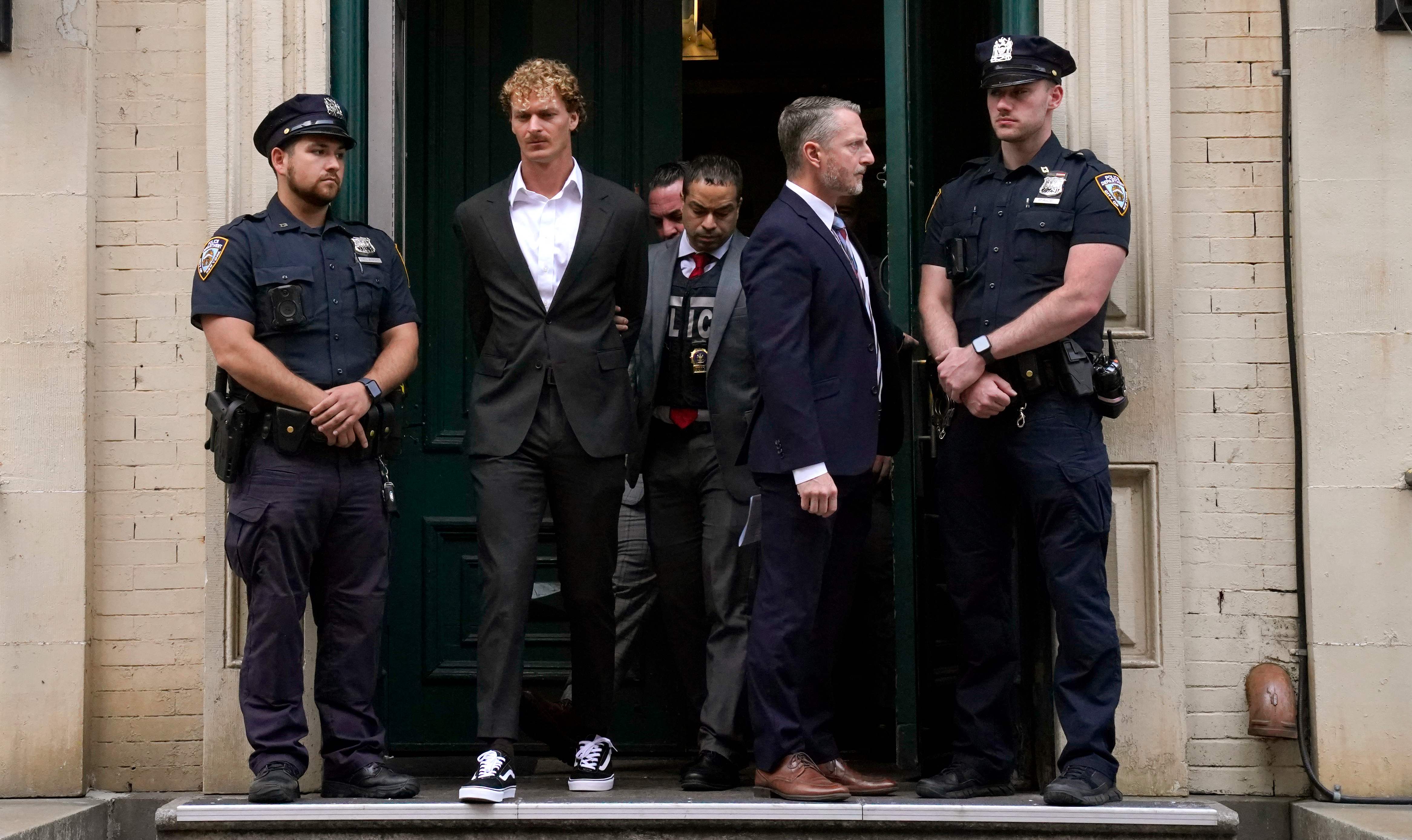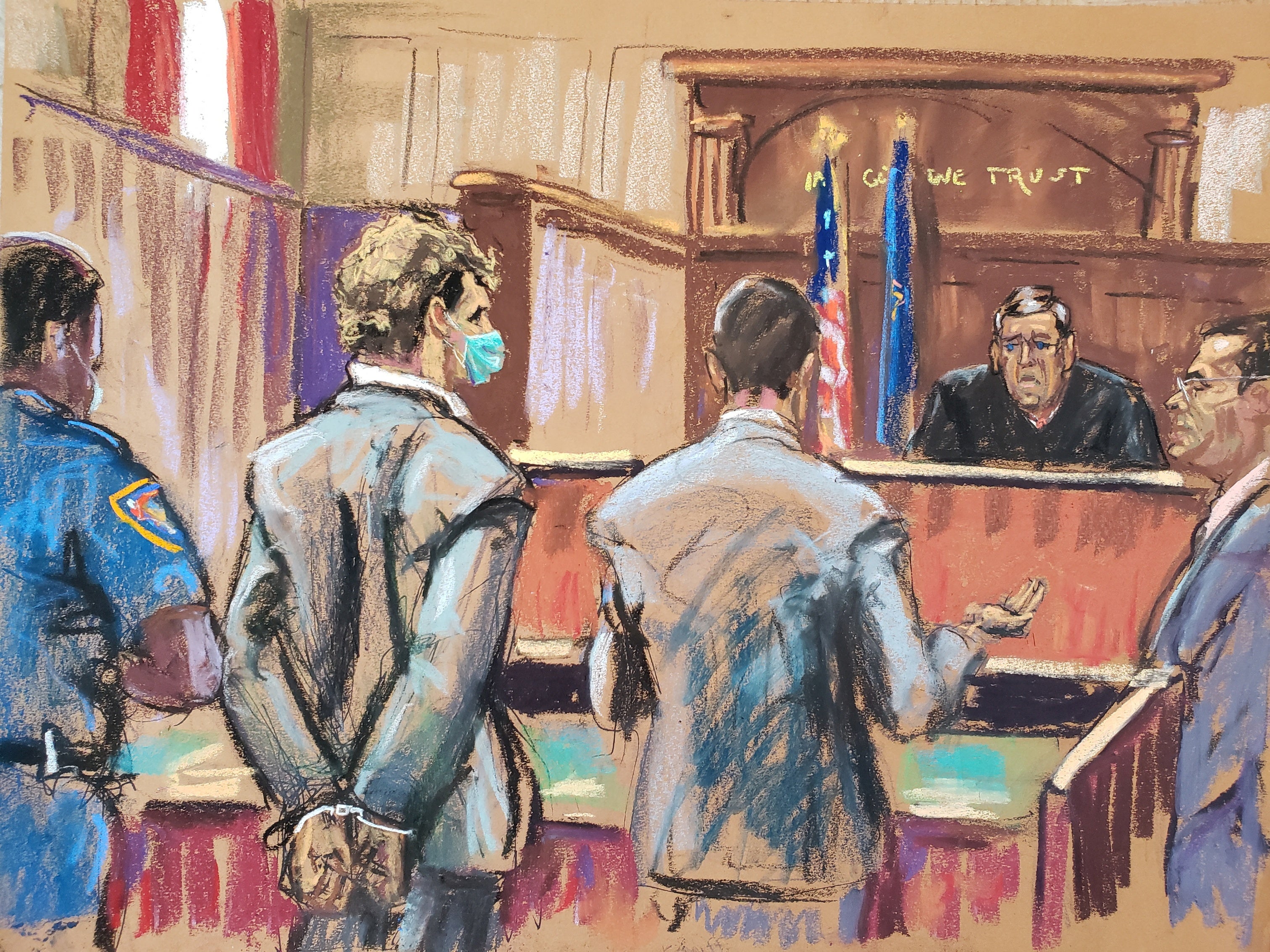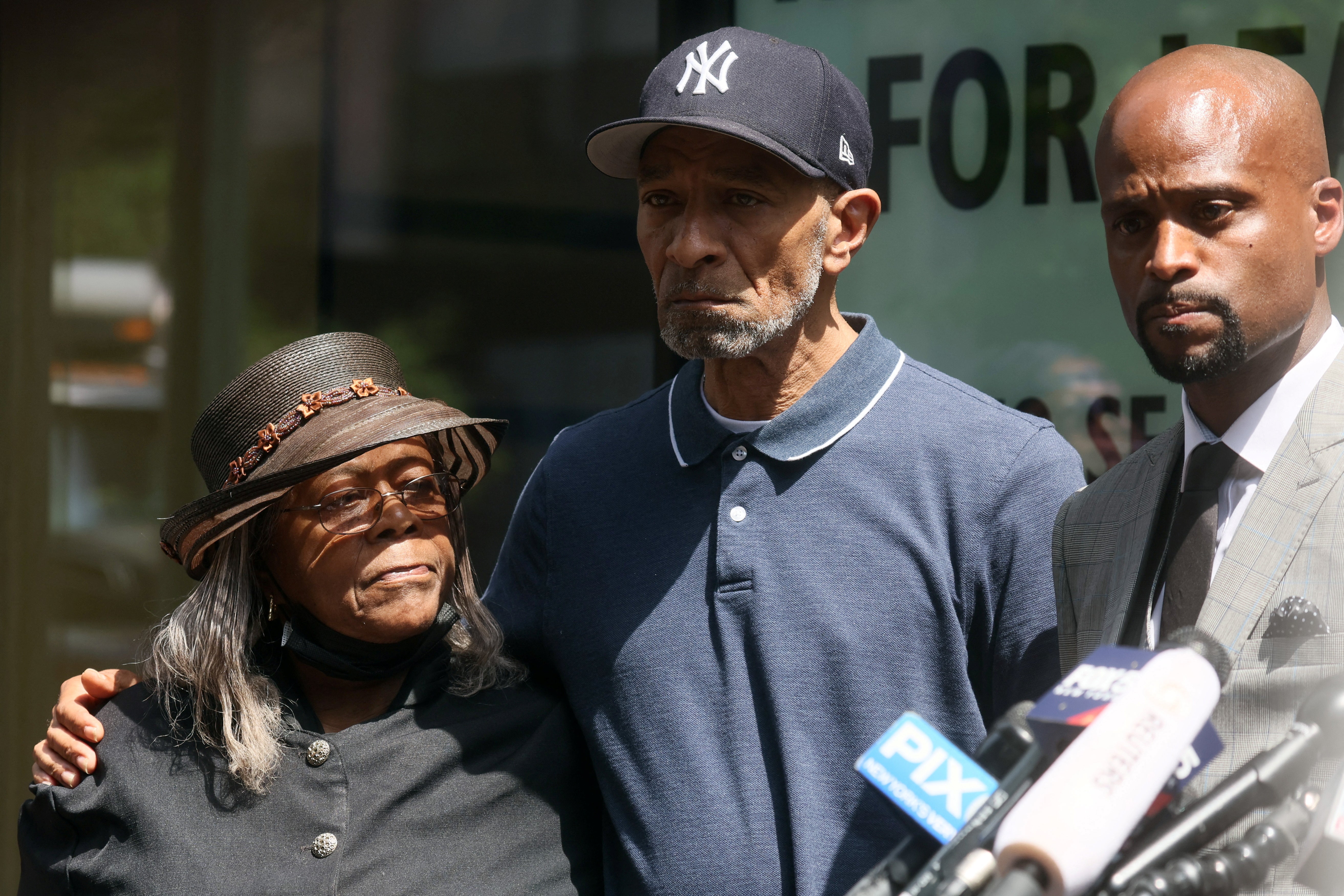Daniel Penny charged with manslaughter for the death of Jordan Neely in a case that has shaken New York
A grand jury will likely consider an indictment after the 24-year-old former Marine was released on bail

Eleven days after Daniel Penny fatally choked Jordan Neely on a New York City subway train car, the former US Marine was formally charged with second-degree manslaughter.
Mr Penny, 24, surrendered to the New York City Police Department’s 5th precinct in Manhattan on 12 May before his brief arraignment in handcuffs inside Manhattan Criminal Court later that afternoon.
He did not enter a plea to the charge. A grand jury will convene to determine an indictment. He was released after posting $100,000 bail, and his next appearance is scheduled for 17 July.
The case surrounding Neely’s death, which was recorded on a cell phone and shared widely, has sparked widespread debate and protests traversing issues of race, criminal justice, urgently needed care for people experiencing homelessness and support for mentally ill New Yorkers.
Lawmakers and advocacy groups have pointed to Neely’s killing and prevailing attitudes endorsing vigilante violence as a tragic consequence of an epidemic of failed policy and institutional neglect towards the city’s most vulnerable populations.
The investigation into Neely’s death involved several witness interviews, a review of photo and video evidence, and a discussion with the medical examiner’s office, which determined Neely’s cause of death was homicide.
The office of Manhattan District Attorney Alvin Bragg determined there was probable cause to charge Mr Penny.
“Jordan Neely should still be alive today, and my thoughts continue to be with his family and loved ones as they mourn his loss during this extremely painful time,” Mr Bragg said in a statement after Mr Penny’s court appearance.
The case also has captured the volatility of sensational media coverage around New York City and other Democratic-led cities, with networks and pundits depicting homeless criminals as an apocalyptic and existential threat holding residents hostage.
Mr Penny has been hailed as a hero by right-wing personalities in claims that echo across social media; Fox News host Greg Gutfeld described the manslaughter charges as “pro-criminal” and “anti-hero”. An online fundraising campaign for Mr Penny’s legal defence was launched on the Christian crowdfunding platform GiveSendGo, a website created in response to GoFundMe removing far-right campaigns that violated its terms of service. The fundraiser has collected nearly $500,000 as of 12 May.

Mr Penny, a college student from Long Island’s Suffolk County, served in the Marines as a rifleman from 2017 to 2021 and reached the rank of sergeant, according to military records.
On 1 May, a man identified as Mr Penny placed the 30-year-old homeless former street performer in a chokehold for several minutes on the floor of an F train on the Broadway-Lafayette platform in Manhattan.
Witnesses stated that Neely, who was experiencing a mental health crisis in the days and months leading up to his death, walked into the train car loudly complaining of hunger and thirst, said he was not afraid to go to jail or die, then threw his jacket to the ground before Mr Penny grabbed him from behind and wrestled him to the ground. Cell phone video captured Mr Penny pinning Neely to the ground for several minutes while his arm was wrapped around his neck. Witnesses said that Neely did not physically attack anyone on the train that day.
Attorneys for Mr Penny said in a statement shared with the The Independent that they are “confident” he will be “fully absolved of any wrongdoing” when all the “facts and circumstances” emerge.
“When Mr Penny, a decorated Marine veteran, stepped in to protect himself and his fellow New Yorkers, his well-being was not assured. He risked his own life and safety, for the good of his fellow passengers,” according to the statement from the firm Raiser and Kenniff.
“The unfortunate result was the unintended and unforeseen death of Mr Neely,” they wrote.

Neely’s family and the legal team supporting them have repeatedly characterised Mr Penny as the sole aggressor who escalated Neely’s distress to lethal violence.
“Daniel Penny is getting a chance to rewrite his story as time goes by,” Lennon Edwards said during a news conference in Manhattan on 12 May. “He cannot rewrite how the story ends. The story ends with his arms wrapped around Jordan’s neck and choking him to death.”
Attorney Donte Mills asserted that “there was no attack” against subway passengers before Mr Penny grabbed Neely by his neck and pinned him to the floor of the train.
“Mr Neely did not attack anyone. He did not touch anyone. He did not hit anyone. But he was choked to death,” Mr Mills said.
The attorneys stood alongside Andre Zachery, Neely’s father, and Mildred Mahazu, Neely’s aunt, with a photograph of Neely in a school graduation cap and gown.
Mr Penny “acted with indifference,” Mr Mills said.
“He didn’t care about Jordan, he cared about himself. And we can’t let that stand,” he added. “What did he think would happen?”

Neely, who was known for his precise Michael Jackson impersonation on the street and in the subway, was well known among homeless outreach workers and emergency responders. He was arrested numerous times, mostly for minor crimes, and for at least two instances of assault on the subway.
Shortly before charges were announced by Manhattan prosecutors on 11 May, homeless advocacy groups and city officials held separate events – a vigil for the deaths of homeless New Yorkers outside City Hall, a rally demanding justice for Neely’s – underscoring the scale of death among people who sleep on the streets and in subways.
Of the 640 deaths among homeless New Yorkers in 2021, 151 were unsheltered, according to city data. And in the deadliest year on record for New York’s homeless population, 815 people died while homeless in 2022.
More than 70,000 people are sleeping in the city’s shelter system, according to Coalition for the Homeless. That figure does not include the thousands of New Yorkers on the city’s streets and subways.
In his first public address on Neely’s death, after two dozen people were arrested at protests and vigils urging action from the city, Mayor Eric Adams stated that “Jordan Neely did not deserve to die,” his “life mattered” and his death “never should have happened.”
“This should be an inflection point for our city,” said New York City Council speaker Adrienne Adams, “to focus on ensuring New Yorkers have access to the essential services needed to be healthy and safe, and we make the budget investments and policy changes necessary to achieve this.”




